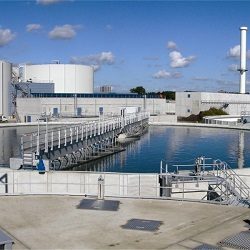Advanced Filtration TEchnologies for the Recovery and Later conversIon of relevant Fractions from wastEwater
The AFTERLIFE project proposes a flexible, cost- and resource-efficient process for recovering and valorising the relevant fractions from wastewater. It will represent an advance on existing approaches to wastewater treatment, which rely on physic-chemical and biological methods.
The AFTERLIFE process will separate out the different components of value using a series of membrane filtration units that will separate all the solids in the wastewater. These will then treated to obtain high-pure extracts and metabolites or, alternatively, to be converted into value-added biopolymers; polyhydroxyalkanoates(PHAs).
In addition to the value extracted from the solids, the remaining outflow of the water will be ultrapure and ready for re-use.
The outcome of the project will be focused on:
- Demonstration of an integrated pilot using real wastewater from three water intensive food processing industries (fruit processing, cheese and sweets manufacturing)
- Demonstration of the applicability of the recovered compounds and the value added bioproducts in manufacturing environments
OBJECTIVES
The overarching objective of the AFTERLIFE project is to demonstrate, at TRL-5 (TRL = Technology Readiness Level), an innovative wastewater treatment that simultaneously recovers compounds of interest while converting the remaining organic matter into a high-volume added value biopolymer. Specifically, it sets out to:
- Develop the filtration system for recovering suspended and soluble solids in wastewater by using membrane filtration units.
- Develop the process for recovering and purifying valuable compounds in the concentrates extracted in the filtration step.
- Develop an anaerobic/aerobic process for converting the low value-added organic matter into PHAs.
- Optimise the resources in the process, following a circular economy approach
- Design and optimise the AFTERLIFE process from a holistic perspective following a Multidisciplinary Design Optimisation (MDO) approach
- Conduct a demonstration, at a pilot scale, using real industrial wastewater to generate the end products
- Prove the economic and industrial feasibility for the AFTERLIFE process along with a comprehensive Lifecycle Analysis (LCA) and cost assessment.
- Promote exploitation of the project’s results and expand its impact.
ACTIVITIES of Bio Base Europe Pilot Plant
- PHA recovery: BBEPP will improve the recovery step by developing a cost-effective process for the purification of PHAs from fermentation broths to be competitive as a bioplastic in some applications
- Integrated process design and MDO optimisation:
- BBEPP will translate the results from the holistic mathematical model into a process design incl. a flow chart and a process and instrumentation diagram
- BBEPP will prepare a process flow diagram for a commercial plant
- Pilot deployment and demonstration: BBEPP will build a pilot line and assess the technical feasibility on pilot scale (equivalent to a wastewater conversion of 1 m3/d). The integrated process will be validated at pilot scale with real wastewater from the project partners
DOWNLOADS and LINKS
PARTNERS
- Idener – Optimizacion Orientada a la Sostenibilidad SL, ES
- AUSTEP-AUSTEAM Environmental Protection SPA, IT
- BIO BASE EUROPE PILOT PLANT VZW, BE
- CELABOR SCRL, BE
- LUREDERRA, Fundacion para el Desarrollo Tecnologico y Social, ES
- MI-PLAST bio-company, HR
- NOVA-INSTITUT für Politische und Okologische innovation GMBH, DE
- Teknologian Tutkimuskeskus VTT Oy, FI
- Consejo Superior de Investigociones Cientificas, ES
- Centro Tecnologico Nacional de la Conserva y Alimentación, ES
- A NOVA ID FCT – Associacao paea a Inovacao e Desenvolvimento da FCT, PT
- JAKE SA, ES
- HERITAGE 1466, BE
- CITROMIL SL, ES
SUPPORTED by:
This project has received funding from the BioBased Industries Joint Undertaking under the European Union’s Horizon 2020 research and innovation programme under grant agreement No 745737.



 webdesign
webdesign